|
|
|
Sort Order |
|
|
|
Items / Page
|
|
|
|
|
|
|
| Srl | Item |
| 1 |
ID:
092173
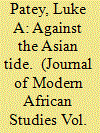

|
|
|
|
|
| Publication |
2009.
|
| Summary/Abstract |
The efforts of American activists to pressure Asian corporations in Sudan have to date resembled a struggle to find the light switch in the dark, or swimming against a strong current. While the impact of the divestment campaign in the United States has been increasingly evident, its effectiveness in producing actual results in Sudan remains suspect. Thanks to China and a trio of Asian national oil companies, oil still flows in Sudan. The campaign's activities have failed to incorporate Sudan's wider international political and economic relations into its strategy. It has rather paradoxically sought to pressure state-owned corporations through financial market divestment. The nature of its Asian targets, reluctant Western investors and a distracted American government have obstructed the campaign from having a resounding impact in Sudan.
|
|
|
|
|
|
|
|
|
|
|
|
|
|
|
|
| 2 |
ID:
117585
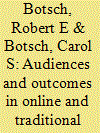

|
|
|
|
|
| Publication |
2012.
|
| Summary/Abstract |
In 1997 we first offered American government classes online as well as face-to-face classes. We administered pre- and posttests to our students to measure their general knowledge of American government, political attitudes, demographics, and some behaviors. Following an initial report in 2001, we continued to gather data for 10 more years; this current study covers nearly 3,200 students during 13 years. We examine the sample as a whole and changes in audiences and outcomes, over time, for the two teaching formats. Although the kinds of students taking online classes have become more similar, a few differences persist. Learning outcome differences continue to be insignificant. Neither format has a clear advantage in students' changes in attitudes, but the online classes increased students' newspaper reading. Class dropout rate and faculty workload both favor face-to-face classes, but flexibility in scheduling and student demand clearly favor online classes.
|
|
|
|
|
|
|
|
|
|
|
|
|
|
|
|
| 3 |
ID:
149361
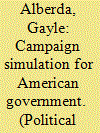

|
|
|
|
|
| Summary/Abstract |
Instructors of American government are challenged with teaching students from a variety of disciplines. Utilizing active learning methods captures students in a manner traditional lectures cannot. For this study I employed an experimental design to assess a campaign simulation used in an Introduction to American Government course. Results show the simulation aided in students’ learning about campaigns and elections.
|
|
|
|
|
|
|
|
|
|
|
|
|
|
|
|
| 4 |
ID:
140224
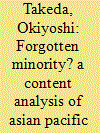

|
|
|
|
|
| Summary/Abstract |
Textbooks are the most important pedagogical tools in higher education and they should convey sufficient and accurate information on minority groups and women in the United States. Yet textbooks tend to marginalize these groups in their depictions. This article examines the coverage of Asian Pacific Americans in twenty-eight American Government or Politics textbooks. Asian Pacific Americans have faced a unique history of exclusion, discrimination, and stereotyping. The content analysis of the textbooks reveals that textbooks do not fully cover their history and contributions to US politics, either measured by page numbers or by historical events and figures important to Asian Pacific Americans. To rectify this lack of coverage, this article concludes with five constructive recommendations, including an option to invite scholars on Asian Pacific American politics to serve as textbook reviewers and textbook coauthors.
|
|
|
|
|
|
|
|
|
|
|
|
|
|
|
|
| 5 |
ID:
095402
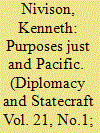

|
|
|
|
|
| Publication |
2010.
|
| Summary/Abstract |
The Administration of Franklin Pierce has frequently been the object of study for historians of antebellum domestic politics, but few have examined the contribution of the Administration's foreign policy initiatives and objectives. This paper demonstrates that Pierce's foreign policy drew from the same partisan well as his domestic politics: a strict interpretation of power under the Constitution and a strong sense of racial paternalism that had come to define the ideological core of Democratic Party by the 1850s. In the arena of foreign affairs, these two ideological principles worked at cross-purposes, as the adherence to small government hampered efforts to exercise paternalism abroad. Whilst Pierce and his lieutenants thus claimed few actual foreign policy achievements, they nonetheless provided a blueprint for an American empire founded upon racial paternalism that would emerge with a much larger and stronger American government at the close of the nineteenth-century.
|
|
|
|
|
|
|
|
|
|
|
|
|
|
|
|
| 6 |
ID:
132074
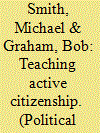

|
|
|
|
|
| Publication |
2014.
|
| Summary/Abstract |
The authors of this article advocate a new curriculum that can be applied to American government, introduction to political science, and state and local government courses. For the past half-century, high school and college general-education requirements have deemphasized civics, government, and political science. In response to the corresponding decrease in the nation's civic health, this proposal is based on three principles. First, teaching citizenship is different than teaching civics. Second, citizenship is taught most effectively by engagement in the "real world," with students completing projects that take them step by step through the policy-change process. Finally, the education and preparation of future high school government teachers needs to change to encourage them to teach their students the rights, responsibilities, and competencies of active citizenship.
|
|
|
|
|
|
|
|
|
|
|
|
|
|
|
|
|
|
|
|
|